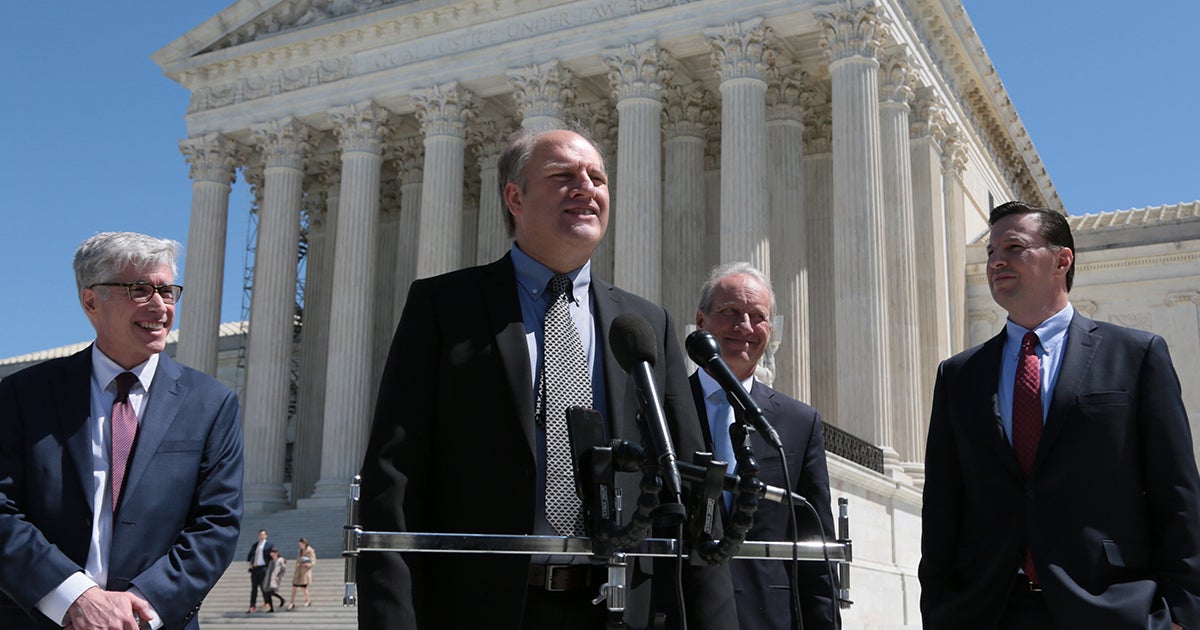
by Jorge Gomez • 7 min read
Just last month, First Liberty argued at the U.S. Supreme Court on behalf of faithful carrier Gerald Groff, who was forced to quit his job because of his religious beliefs. Led by our volunteer attorney Aaron Streett of the law firm Baker Botts, we made the case that Americans should not be forced to choose between their faith and their livelihood.
The Court will issue its decision by the end of June. As we wait for the ruling, many Americans are asking whether Gerald will win and how this could impact religious freedom.
It’s impossible to predict exactly how the Court will rule. But after the recent argument, people of faith should be optimistic.
First Liberty President Kelly Shackelford explained in a recent First Liberty Live! episode what he gleaned from the justices’ questions during oral argument.
“A lot of their questions weren’t if they’re going to go to a different standard,” Kelly said. “I want people to realize the good news. This is moving in a positive way for religious freedom. It’s just a matter of how far it’s going to move.”
First Liberty attorney Jeremy Dys says that guessing a ruling can often be a “humbling exercise.” But he agrees with Kelly that it seems the Court is likely going to hand down a favorable decision. In an op-ed for The Boston Herald, Dys wrote:
“In response to recent oral arguments in Groff v. DeJoy, one thing may be certain: The court will address and adjust a decades-old decision from a case that has thwarted religious liberty protections for American employees ever since. The question is how far the court might go in restoring religious liberty to the workplace.”
Dys adds, “It seemed clear during oral argument that a majority of the justices seem willing to jettison the de minimis holding of Hardison.” He’s referring to the 1977 case TWA v. Hardison that tipped the balance in favor of corporations and the government. That ruling set the de minimis cost standard, giving employers power to deny religious accommodation requests by citing trivial business inconveniences.
We’re asking the Court to revisit that ruling. We’re making the case for a legal standard that would require employers to prove that workers’ religious accommodations would impose a “significant difficulty or expense” to their businesses in order to deny them.
In case you missed it, here’s a special roundtable conversation with Kelly and Chief Legal Officer Jeff Mateer. They give more insight into what the final verdict could be. Watch below:
When we presented the case, several justices—including Samuel Alito, Neil Gorsuch and Clarence Thomas—appeared to be willing to revisit Hardison, suggesting the current standard is disproportionately preferential to employers.
Justice Gorsuch, for example, said the “de minimis cost” test was too expansive to be the only standard. He suggested there might be “common ground” to help clarify that the court’s standard was meant to be higher than just a trivial or inconvenient cost to the employer. “Maybe, we could do a good day’s work,” he added, “and put a period at the end of it by saying that is not the law.”
Legal experts and a vast number of media outlets picked up that theme. Many seem to agree this is not so much whether the Court will rule favorably for religious freedom, but how far it will raise the standard.
George Washington University Law School professor Jonathan Turley recently wrote the “de minimis test is at issue now in Groff and the Court is likely to change or dispense with the test, in my view.”
Nathan Diament, executive director for public policy at Orthodox Union, one of the nation’s largest Jewish advocacy organizations, told The Washington Post that “either side will be shocked if the court does not rule in favor of Mr. Groff.”
National Catholic Register echoed this assessment saying, “the indications are that a majority of the justices will support Groff.”
The New York Times’ headline on the day of argument read “Supreme Court Seems Ready to Strengthen Protections for Religious Workers.” The article explained that “by the conclusion of the argument it seemed clear that Mr. Groff would emerge with a more protective legal standard.”
“A lower court had ruled against the worker, Gerald Groff, holding that his request would cause an ‘undue burden’ on the USPS,” CNN wrote. But, “there appeared to be consensus, after almost two hours of oral arguments, that the appeals court had been too quick to rule against Groff.”
Please continue praying for Gerald, our legal team and the Supreme Court justices while we wait for the decision. Victory is never guaranteed, but people of faith should have hope. The justices have an incredible opportunity to clarify the law and ensure religious people are not forced to choose between their faith and their job.